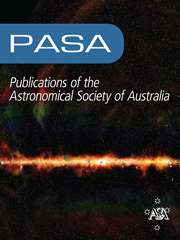Article contents
The Fraction of Ionizing Photons Escaping from High-Redshift Galaxies
Published online by Cambridge University Press: 02 January 2013
Abstract
The fraction (fesc) of ionizing photons that escape their host galaxy and so are able to ionize hydrogen in the intergalactic medium is a critical parameter in studies of the reionization era. In this paper we constrain fesc at high redshift by modelling the observed Lyα transmission. Using an N-body simulation of the cosmic web, we first model an ionizing background due to star-bursting galaxies. We then extract an ensemble of mock absorption spectra from the simulation and compute the mean transmission. We adjust the free parameter, fesc in our model of the ionizing background to reproduce the observed transmission. We find that fesc increases with the minimum galaxy mass considered to contribute to the ionizing background, and that at high redshift fesc must be greater than 5% irrespective of galaxy mass. Based on our numerical results we calibrate a semi-analytic model which shows that the ionizing background observed at z ∼ 5.5–6 implies a sufficient number of ionizing photons to have reionized the Universe by z ∼ 6. However, if the minimum mass for star-formation were ≳109 M⊙, the ionizing background would be over-produced at z ≲ 5. In summary, our results indicate that the Universe was reionized by low mass galaxies.
Keywords
- Type
- Research Article
- Information
- Copyright
- Copyright © Astronomical Society of Australia 2010
References
- 11
- Cited by


